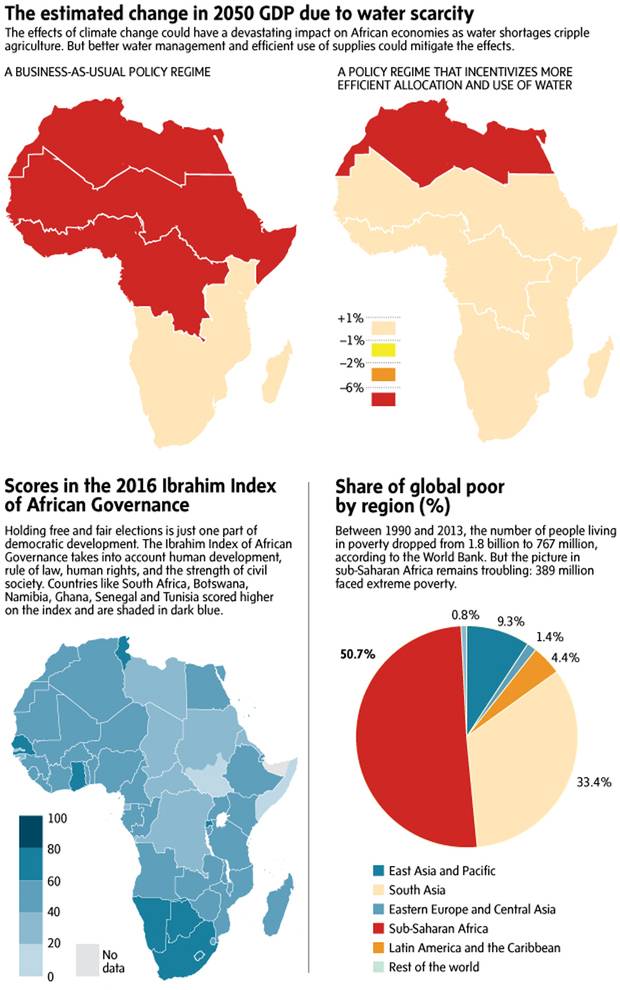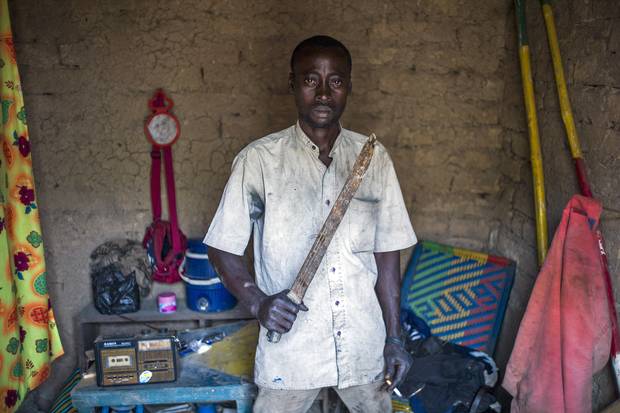With a Canadian military deployment looming on the horizon, Prime Minister Justin Trudeau will try to persuade Africans this week that he sees the continent as more than a security problem.
Mr. Trudeau will travel to Liberia on Thursday for the beginning of his first official trip to Africa, followed by a visit to Madagascar for the Francophonie summit of French-speaking countries. But his meetings with African leaders will be overshadowed by the planned deployment of as many as 600 Canadian troops for "peace and stabilization" operations on the continent, with Mali the most likely location for the mission.
Mr. Trudeau is promoting his four-day trip as another phase in his "Canada is back" campaign, reviving global relationships that were neglected under the previous, Conservative government. "This visit to Liberia and Madagascar demonstrates Canada's renewed commitment to Africa," he said in a statement.
"We want to strengthen relations with our African partners and advance issues such as the rights of women and girls, gender equality, health and peace and security."

A French soldier patrols during a tactical flight on March 12 over Mali.
Pascal Guyot/AFP/Getty Images
But while he put security at the end of his list of priorities, it is certain to consume the bulk of Canada's new spending in Africa. The deployment of Canadian troops and equipment in a remote African country such as Mali will be far more expensive than any other new Canadian initiative in the region.
Security issues were a top priority for Foreign Affairs Minister Stéphane Dion this month on his first trip to sub-Saharan Africa. His department said his visit focused on "peace and stability, security and the rule of law."
In his visit to Kenya, for example, Mr. Dion announced Canadian financing for five separate security-related initiatives, including projects to fight terrorism and violent extremism, an anti-radicalization program and a border security project.
Liberal cabinet ministers have been careful to describe their military plans for Africa as just one element of what they call a "whole of government" approach, which will include diplomacy and training. Seeking to differentiate themselves from their Conservative predecessors, they have also talked extensively about issues such as climate change and gender rights in Africa.

TRISH McALASTER/THE GLOBE AND MAIL (SOURCES: WORLD BANK; MO IBRAHIM FOUNDATION)
But despite the flurry of visits and announcements, there is still no sign of an overarching Liberal strategy for Africa, analysts say. Instead, the military mission is dominating the agenda, while key African powers such as South Africa are neglected.
At a time when the United States is likely to scale back its African connections under the isolationist ideology of president-elect Donald Trump, there is a clear opening for Canada to step into the vacuum and build a stronger partnership with African nations. But so far Ottawa doesn't seem keen to seize this opportunity.
Analysts are puzzled by Mr. Trudeau's decision to bypass Africa's two biggest economies, South Africa and Nigeria, on his first visit to the continent. Both are crucial democracies in a region where democracy is increasingly under threat, and South Africa is the only African member of the G20.
Instead, the Prime Minister is visiting two smaller countries with little strategic importance or influence. His visit to Madagascar, admittedly, was dictated by the site of the Francophonie summit, but he could have combined it with a visit to more important African countries. Instead, he chose Liberia.
There has been speculation that he decided not to visit South Africa because of its recent decision to withdraw from the International Criminal Court, which Canada helped create in the late 1990s. But if this was the reason, it demonstrates a failure to recognize South Africa's strong economic and political influence in the region, analysts say.

A Malian man poses at his home with a machete to protect himself from Islamist rebel groups, in Mopti, in 2013.
FRED DUFOUR/AFP/Getty Images
Despite the goodwill built up by Canada's strong support for the anti-apartheid movement, Canada has failed to send a prime minister or foreign affairs minister on an official bilateral visit to South Africa for more than a decade. (Former prime minister Stephen Harper visited South Africa briefly in 2013, but only to attend a memorial service for Nelson Mandela.)
David Hornsby, a Canadian scholar in South Africa, says the decision to bypass South Africa is a disappointing contradiction of Mr. Trudeau's political rhetoric.
"This is particularly surprising given that South Africa is one of Canada's largest trading partners on the continent," said Mr. Hornsby, a professor of international relations at the University of the Witwatersrand in Johannesburg. "I would have thought South Africa would have been high on his priority list, given historical links, common values and economic ties."
Chris Roberts, who teaches African politics at the University of Calgary and runs an Africa consultancy, says there is growing skepticism about Canada among many African leaders because of Canada's ever-oscillat ing policy toward the continent.
"They've seen Canada come and go in the past," he said. "There are moments of real engagement, and then it slides off the table again."
Mr. Trudeau's decision to bypass South Africa was an odd choice, and his decision to visit Liberia and Madagascar "doesn't seem to address the question of a bigger policy strategy," Mr. Roberts said.
An armoured personnel carrier of The United Nations Multidimensional Integrated Stabilization Mission in Mali is parked in Timbuktu on September 19, 2016.
SEBASTIEN RIEUSSEC/AFP/Getty Images
Renewing Canada's relationship with Africa
While Canada prepares to announce a military deployment to Africa on a "peace and stabilization" mission, Ottawa may be neglecting some other crucial elements of the Canada-Africa relationship. Here are three areas where Canada could make a difference.
DEMOCRACY
A growing number of African countries have shifted in an authoritarian direction in recent years, yet Western countries such as Canada have done little to discourage the trend. Elections have been rigged, presidents have extended their rule, opposition has been crushed and large numbers of peaceful protesters have been killed by security forces. This year alone, governments have moved toward a more repressive rule in countries such as Ethiopia, Burundi, South Sudan, Gabon, Zimbabwe, Uganda, Zambia and the Democratic Republic of the Congo.
Yet there is little sign of Canadian support for the pro-democracy movements in these African countries. In recent months, two Canadian cabinet ministers have visited Ethiopia, one of the most ruthlessly authoritarian states in Africa, where the authorities have reportedly arrested more than 11,000 people and killed more than 500 protesters. Foreign Affairs Minister Stéphane Dion, after meeting Ethiopia's leaders this month, issued only a mild statement: "More can be done to engage Ethiopians in the democratic process."
The African Union, which represents the leaders of all African countries, has done almost nothing to stop this drift. Its election observers have repeatedly given their stamp of approval to unfair elections, while its summits have rejected any talk of intervening to protect civilians in countries where the government refuses to accept an outside force. Canadian cabinet ministers have repeatedly travelled to the AU's headquarters in Ethiopia to provide funds to the African Union and to cultivate it as a partner. They need to look beyond the AU if they want to promote democracy.
CLIMATE CHANGE
Africa remains extremely vulnerable to climate change. This year, a devastating drought in a dozen African countries caused food shortages for more than 40 million people, leaving them in desperate need of humanitarian assistance. Experts say the drought was largely a result of climate change, which dramatically amplified the effects of El Nino, the periodic shift in weather patterns caused by Pacific Ocean warming. The drought has led to failed harvests, starving animal herds, steep rises in food prices and disappearing water reservoirs.
The government of Prime Minister Justin Trudeau has been worried about the impact of climate change in Africa. In his visits to three African countries this month, Mr. Dion met leaders who told him that the changing climate is causing hunger and violent conflict. But the government will have to go beyond verbal support to find specific ways of mitigating the damage of climate change in Africa, while still trying to protect the Paris climate agreement at a time when U.S. president-elect Donald Trump wants to rip it up.
POVERTY REDUCTION
Extreme poverty is increasingly concentrated in Africa. Economic progress in East Asia and South Asia has reduced the proportion of the world's poor who live in those regions. Today, more than half of the world's poor live in sub-Saharan Africa. The fight against poverty has been much slower there than in Asia, especially because of Africa's fast-rising population.
Under the previous, Conservative government, Canada's foreign-aid policies were often determined by the government's military and commercial objectives rather than the goal of reducing poverty. Afghanistan, for example, became the biggest recipient of Canadian development assistance when Canada was waging war there, even though the aid was often ineffective. Some of the poorest African countries were removed from the list of "countries of focus" for Canadian aid. The government's aid agency was directed instead to forge partnerships with private mining companies, while devoting resources to middle-income countries or countries with large mining sectors.
Under the new government, there will be less emphasis on partnerships with mining companies and more emphasis on poverty-reduction programs. But simply pouring aid dollars into Africa could increase dependency and waste, so the federal government needs to devise a smarter system of targeted aid.